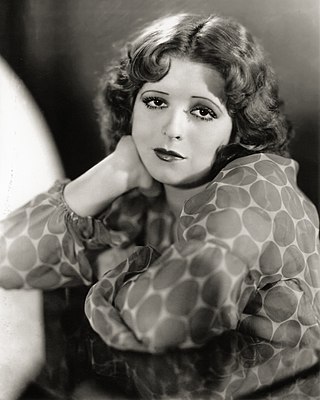
Clara Gordon Bow was an American actress who rose to stardom during the silent film era of the 1920s and successfully made the transition to "talkies" in 1929. Her appearance as a plucky shopgirl in the film It brought her global fame and the nickname "The It Girl". Bow came to personify the Roaring Twenties and is described as its leading sex symbol.

Claire Windsor was an American film actress of the silent screen era.

The Plastic Age is a 1925 American black-and-white silent romantic comedy film directed by Wesley Ruggles and starring Clara Bow, Donald Keith, and Gilbert Roland. The film was based on a best-selling novel from 1924 of the same name, written by Percy Marks, a Brown University English instructor who chronicled the life of the fast-set of that university and used the fictitious Sanford College as a backdrop. The Plastic Age is known to most silent film fans as the very first hit of Clara Bow's career, and helped jumpstart her fast rise to stardom. Frederica Sagor Maas and Eve Unsell adapted the book for the screen.

B. P. Schulberg was an American pioneer film producer and film studio executive.
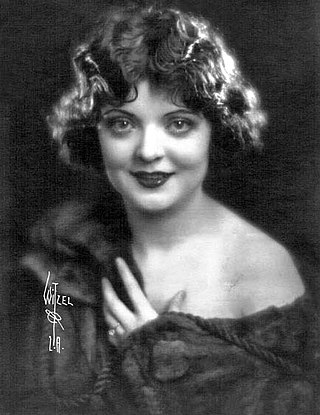
Ethel Shannon was an American actress. She appeared in over 30 silent movies in the early 20th century.

Hobart Van Zandt Bosworth was an American film actor, director, writer, and producer. Bosworth began his career in theater, eventually transitioning to the emerging film industry. Despite a battle with tuberculosis, he found success in silent films, establishing himself as a lead actor and pioneering the industry in California. Bosworth started his own production company, Hobart Bosworth Productions, in 1913, focusing on Jack London melodramas. After the company closed, Bosworth continued to act in supporting roles, surviving the transition to sound films. He is known as the "Dean of Hollywood" for his role in shaping the California film industry. In 1960, Bosworth was awarded a star on the Hollywood Walk of Fame for his contributions to the film industry.
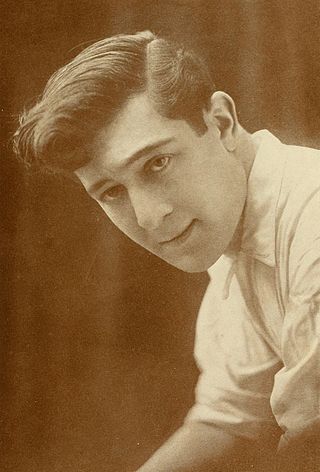
Hobart Henley was an American silent film actor, director, screenwriter and producer. He was involved in over 60 films either as an actor or director or both from 1914 to 1934.

Louis Joseph Gasnier was a French-American film director, producer, screenwriter and stage actor. A cinema pioneer, Gasnier shepherded the early career of comedian Max Linder, co-directed the enormously successful film serial The Perils of Pauline (1914) and capped his output with the notorious low-budget exploitation film Reefer Madness (1936) which was both a critical and box office failure.

Charles Clary was an American actor of the silent film era. Clary appeared in more than 200 films between 1910 and 1930. He was born in Charleston, Illinois and died on his 58th birthday in Los Angeles, California. He worked for Selig and the Fine Arts Film Company. Before Clary joined Selig, he "played stock companies and road shows all over America".

Claude Benton Gillingwater was an American stage and screen actor. He first appeared on the stage then in more than 90 films between 1918 and 1939, including the Academy Award-nominated A Tale of Two Cities (1935) and Conquest (1937). He appeared in several films starring Shirley Temple, beginning with Poor Little Rich Girl (1936).

Tiffany Pictures, which also became Tiffany-Stahl Productions for a time, was a Hollywood motion picture studio in operation from 1921 until 1932. It is considered a Poverty Row studio, whose films had lower budgets, lesser-known stars, and overall lower production values than major studios.
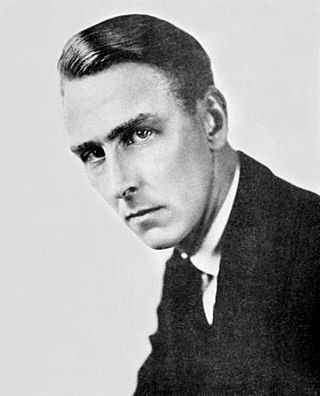
Percy Marmont was an English film actor.

Robert Frazer was an American actor who appeared in some 224 shorts and films from the 1910s until his death. He began in films with the Eclair company which released through Universal Pictures.

Edmund Burns was an American actor. He was best known for his films of the silent 1920s, particularly The Princess from Hoboken (1927), Made for Love (1926), and After the Fog (1929), although he continued acting in films until 1936. Burn's first film appearance was an uncredited role as an extra in The Birth of a Nation (1915). Other films include The Country Kid (1923), The Farmer from Texas (1925), Ransom (1928), The Adorable Outcast (1928), Hard to Get (1929), The Shadow of the Eagle (1932), Hollywood Boulevard (1936), and his last film, Charles Barton's Murder with Pictures (1936) for Paramount Pictures.

Selznick Pictures was an American film production company active between 1916 and 1923 during the silent era.
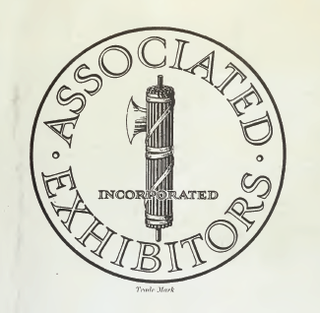
Associated Exhibitors was an American film distribution company active during the silent era. The company did not produce its own pictures but released productions by independent producers, handling a mixture of low-budget and more prestigious films during the 1920s. Established in 1920, it had a close association with Pathe Exchange, another medium-sized American company.
Arrow Film Corporation was an American film production and distribution company during the silent era from 1915 to 1926. An independent company it operated alongside the established studios. Originally formed to supply films for Pathé Exchange, the company quickly separated and concentrated on a mixture of medium and low-budget productions. The company was sometimes referred to as Arrow Pictures.

Harry Fischbeck (1879–1968) was a German-born cinematographer who emigrated to the United States where he worked in the American film industry. He was employed by a variety of different studios during his career including Universal, United Artists and Warner Brothers, but primarily for Paramount Pictures. One of his first credits was for the historical The Lincoln Cycle films directed by John M. Stahl.

The Lee-Bradford Corporation was an American film distributor of the silent era. It was formed by Arthur A. Lee and F.G. Bradford who gave their names to the company. Based in New York City, it handled the output of independent production companies as well as foreign imports. The company arranged a tie-up with the emerging British studio Gainsborough Pictures.

C.C. Burr (1891–1956) was an American film producer of the silent and early sound eras. He also directed eleven short films. Originally an employee at Paramount Pictures, he branched out into independent production working with a number of different distributors over two decades.





















